
How is the work of a doctor at a United Nations Peacekeeping Mission different from when you work at a hospital in Vietnam?
- When I was in Vietnam, I could examine hundreds of patients a day, and the work was very busy. But when I came here, there were fewer patients, but the pressure was twice as much as when I was doing professional work in my home country.
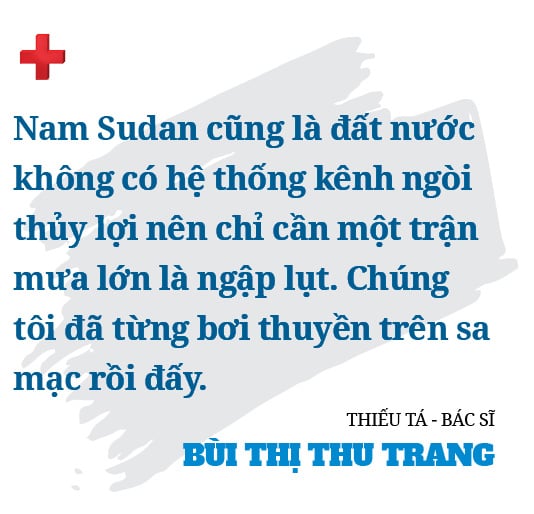
My mission, as well as that of the doctors at Level 2 Field Hospital No. 4, is to examine, treat, and care for UN staff, and also local people if permitted by the commander. But the professional work is only a part, here we are also real soldiers when we join our teammates on guard duty, ensuring security for the hospital; then join the kitchen with the logistics brothers to ensure full meals with diverse dishes, suitable for the tastes of the hospital staff.
Besides the daily work that I just mentioned, we also participate in many cultural and social activities with the locals or friends from other countries in the Mission. In general, it is a colorful life with many emotions.
You mentioned the range of emotions about a new life in a country with many difficulties and deprivations like South Sudan. Surely you still remember how you felt when you set foot on this side ?
- Before coming, we had also received experiences from our predecessors and had imagined many difficulties and shortages that were waiting ahead. However, when I set foot from the airport to Bentiu and directly saw the lives of the people here, I was truly "shocked".
South Sudan is a country in civil war, the people here - especially in Bentiu where we are stationed - are still poor, the minimum human rights are below the limit. The weather is extremely harsh, the temperature difference between day and night can be up to 20 degrees. South Sudan is also a country without an irrigation system, so just a heavy rain can cause flooding. We have sailed in the desert (laughs ). Not to mention the epidemic, malaria, poisonous snakes, cockroaches... crawling all over the house. It is truly terrifying and a big challenge for the hospital staff.
The roads on this side are all dirt roads, from where we are stationed to the capital we have to travel by plane because there are no roads; the brothers often joke with each other "luxurious life, just one step on a plane". When we took over the work from Level 2 Field Hospital No. 3 in early 2022, we had another difficulty: goods and medical supplies were in short supply; the facilities were built from containers so they started to deteriorate, become old and leaky...
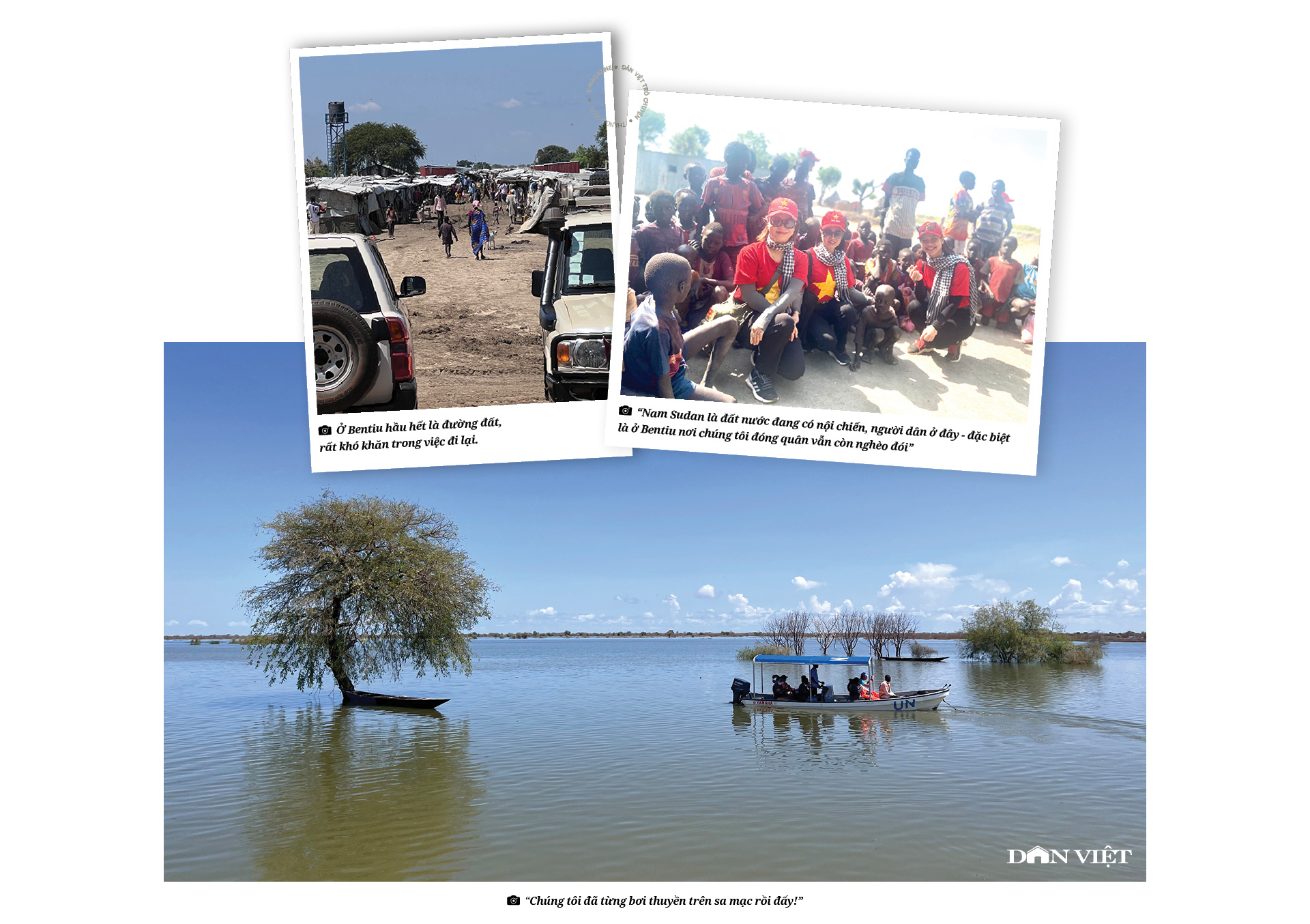

I saw a bougainvillea trellis blooming brightly at the main gate of the hospital, and more green has appeared among the vast red dusty soil . It seems that everything has changed a lot compared to the first time when you and your colleagues took over this place ?
- We are Uncle Ho's soldiers, so everyone in the unit is optimistic, confident, and thinks positively to improve the environment, landscape of the unit and workplace; overcome material and spiritual shortages so that everyone can work with peace of mind.
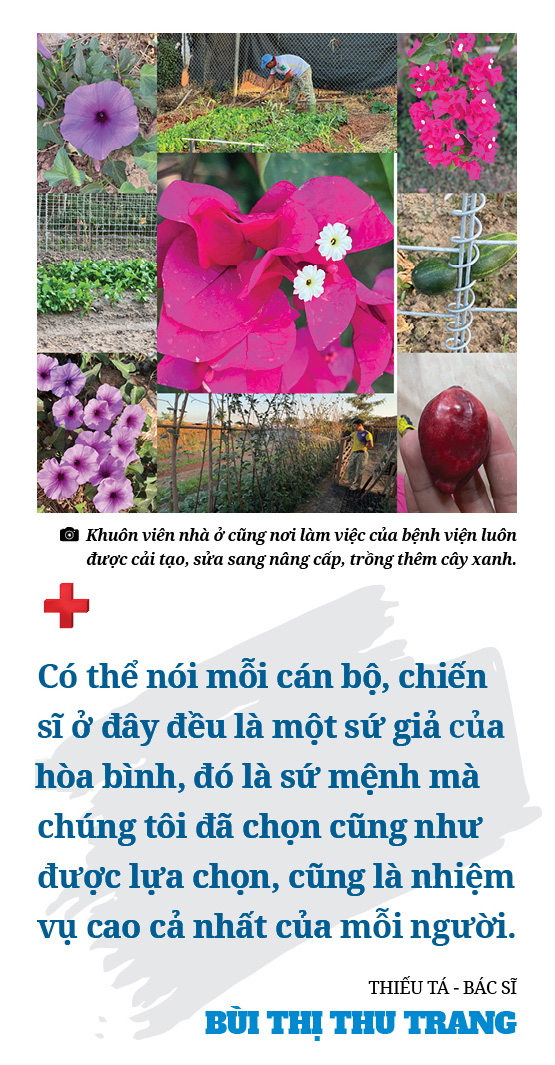
The hospital's residential and working areas are always renovated, upgraded, and more trees are planted. In addition to the internal efforts of the hospital staff, we also asked for your support to repair and fill in the deep, muddy holes caused by heavy rains on the red, slimy ground along with the subsidence for container trucks to move in and out regularly.
Furthermore, we were also inspired by the optimism of the people here. Although they were poor and backward, they always smiled; children, although bathing in dark puddles, were still innocent and happy; a rare spirit of optimism.
In the stories and photos you told on your personal Facebook , I saw many intimate images of the local people , how did they welcome the Vietnamese soldiers ?
- The people are very friendly, especially towards the Vietnamese soldiers. Every time they see the Vietnamese soldiers passing by, the local people always greet them with friendly greetings and warm waves. When the UN vehicle carrying the hospital team approached the village, the local children ran out to wave and welcome the Vietnamese soldiers, mumbling the two words "hello", and then ran after the vehicle. When the vehicle entered the village, the village elders and many other elderly people came out to welcome them very warmly. Because over the years, the presence of the Vietnamese soldiers in the Field Hospitals No. 1, No. 2 and No. 3 has left good impressions and affection from the local people. Some people shared that they are very grateful to the Vietnamese soldiers for helping and supporting them a lot in their daily lives.
They help us feel more clearly our aspirations for a better life. The more difficult the situation, the more the green seeds of hope are nurtured and flourished. They also help us feel that the work here is meaningful, contributing a small part to maintaining peace in this country. That is both a joy and a motivation for us to overcome all difficulties and hardships.
Listening to her story , I also felt moved and proud of the image of Vietnam's green beret soldiers. What chance brought her to this difficult but glorious mission, and to become a true green beret soldier, what standards are needed ?
- I was very surprised to receive this assignment. I was the last person to receive the direct decision from the Minister of National Defense to join the army for training to prepare for the task of replacing the Level 2 Field Hospital No. 3 in mid-July 2021 when the hospital had been in training for nearly a year. To become a green beret, you must of course have good expertise, work experience and especially good health to complete the 1.5 year training course.
Compared to my teammates, I had to work 2 or 3 times harder, and the biggest challenge for me was learning a foreign language. I worked day and night for 4 months to complete the foreign language program as required by the United Nations (UN). Because examining and treating staff in the UNMISS Mission is not simple. After examining, we had to explain and talk to the patient so that they understood why they used this medicine, why they did not treat this way but that way...
We were also trained in many basic UN staff rules, disaster and epidemic response situations, and physical activities that must meet UN standards. We also learned about farming, soft skills for survival, silk and paper painting, and arts and culture so that we could go and interact with friends around the world.
At the station, there are many United Nations (UN) staff from different countries around the world with different cultures and religions. In order to integrate and introduce Vietnamese culture to friends around the world, we also have to learn about the religious culture of other countries, avoid taboos, and affect the general harmony of UN staff.
As a doctor, what worries you most when working at the Field Hospital ?
- That is, medical equipment is gradually deteriorating and breaking down, while new equipment has not been transported to replace it, which also affects the monitoring and treatment of patients. Many difficult cases have no means of monitoring and must be transferred to higher levels, although the transportation conditions are mostly helicopters.
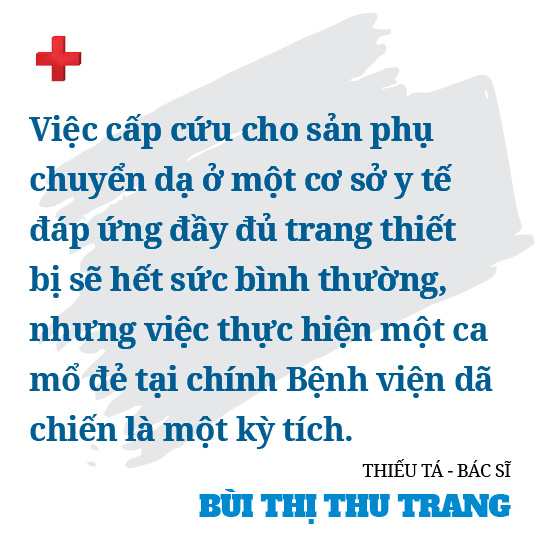
When we go to work, we have to work independently without much support from machines and people like in Vietnam. Language and religious culture have quite big differences so caring for and understanding patients will also be difficult.
Examining and treating patients in a place that is "deficient and weak" in every way, have there been any cases that made you and other doctors "sweat " ?
- In serious cases where the hospital does not have enough equipment and medicine to treat them, we are forced to transfer them to a higher level. That is why the initial examination is very important. Doctors need to diagnose correctly and make accurate decisions to ensure the health and life of the patient.
You might imagine that giving emergency care to a woman in labor in a fully equipped medical facility would be quite normal, but performing a cesarean section at the Field Hospital itself is a miracle.
For example, in the first days of the new year 2023, we successfully performed an emergency surgery on a pregnant woman and welcomed a baby girl to the Mission. The patient was a Gambian national, admitted to the hospital with symptoms of labor, 39 weeks pregnant. As soon as we received the patient, we conducted an examination, the patient's ultrasound results showed that the patient was 39 weeks pregnant, the fetal heart rate was good, and there was no history of underlying diseases. However, the patient had signs of labor, acute contractions.
Recognizing that this was an emergency case and that the patient could not be transferred to a higher level by plane, the hospital leadership decided to ask the medical commander of the Mission for permission to perform emergency surgery to "arrest" the child right at the hospital.
The surgery was successful, the first baby girl was born at the Mission weighing 3.5kg. The baby cried out in the joy and jubilation of all the staff and soldiers of the hospital. Afterwards, the hospital also quickly received high praise from the Mission's medical commander for its quick and accurate diagnosis, safe surgery decision, and excellent care and support for the mother and baby.
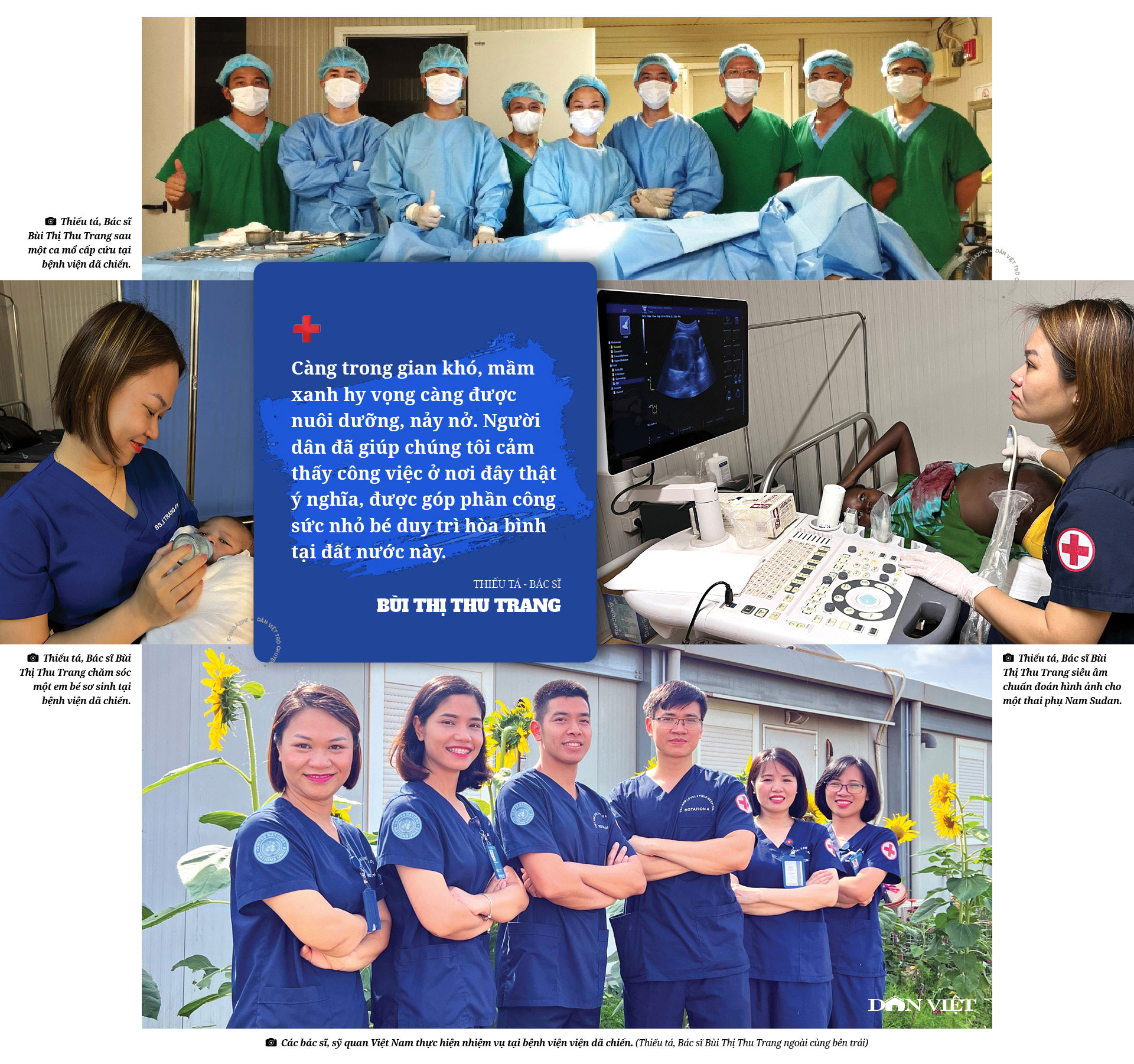
From working in a place with full and spacious equipment; now having to work in a difficult place like the Field Hospital , how did you and your teammates overcome it together ?
- As I mentioned above, we overcame with optimism and positive thinking ( laughs) . Not only Field Hospital No. 4 but also my predecessors also shared the same shortage and difficulty in terms of materials, medical equipment, medicine... Everyone overcame and completed the mission well, so there is no reason for us to "surrender".
Not to mention, the Hospital Board of Directors also struggled to find ways to ensure safe examination and treatment of patients. In addition to the emergency cesarean section I just mentioned, many difficult cases were still handled by doctors, combined with the active support from the governing units in Vietnam such as the Military Medical Academy, the Vietnam Peacekeeping Department, etc., providing medical equipment, medicines as well as other logistical materials.

Accepting the mission at the age of 40 - an age no longer young, what motivated you to set out on this journey and is age an obstacle and challenge for you ?
- I believe that age is just a number, as evidenced by the fact that before me, there were many women my age who went to South Sudan to do peacekeeping. Instead of feeling pressured, I feel honored and proud to be trusted by the hospital leadership as well as the Ministry of Defense leadership to take on this task because not every doctor has this honor.
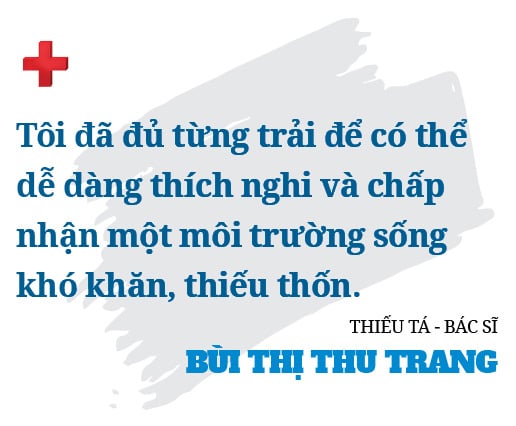
Furthermore, I myself also want to do something to contribute my small efforts to bring a better life to the unfortunate lives, as well as to take care of the people who are serving day and night to preserve world peace. Coming here, I met many comrades from different regions, young people, full of enthusiasm and dedication, making me feel like I am reliving my youthful days more than 20 years ago: vibrant, enthusiastic and devoted.
Being no longer young may be a disadvantage for many people, but for me, it has many advantages: I have enough experience to easily adapt and accept a difficult and deprived living environment. I can be calm and steadfast in the face of unfavorable changes... I think the experience of being near middle age like me brings certain benefits that young people do not have, that is also an advantage, right?
As the mother of three " princess" girls, the oldest of whom is only 15 years old, an age when their mother is most needed, are you afraid that your children will suffer because of their mother's absence ?
- When I chose to become a doctor, it meant that my family would suffer many disadvantages. My husband and children were used to my absence from home because when I worked at Hospital 108, I often had to go on duty. And during the intensive training period before coming here, I was also not at home.
The children are growing up, not being able to accompany them regularly is something that any mother worries about and always keeps in mind. But determining that this is a duty and responsibility to the country, I talked to both sides of the family, confided in my husband and children, and the whole family understood and supported me. I am a person who always thinks positively and optimistically, so I also told my children: "being away from mom is also an opportunity for you to be more independent and mature". I believe my children understand, sympathize and are probably a little proud of their mother's work.
In addition to my family, I also received help from my colleagues at Hospital 108. When I was away from home, my family had health problems that needed to be taken care of, and the sisters in the department always helped wholeheartedly and thoughtfully. I am grateful for those beautiful and sincere feelings.
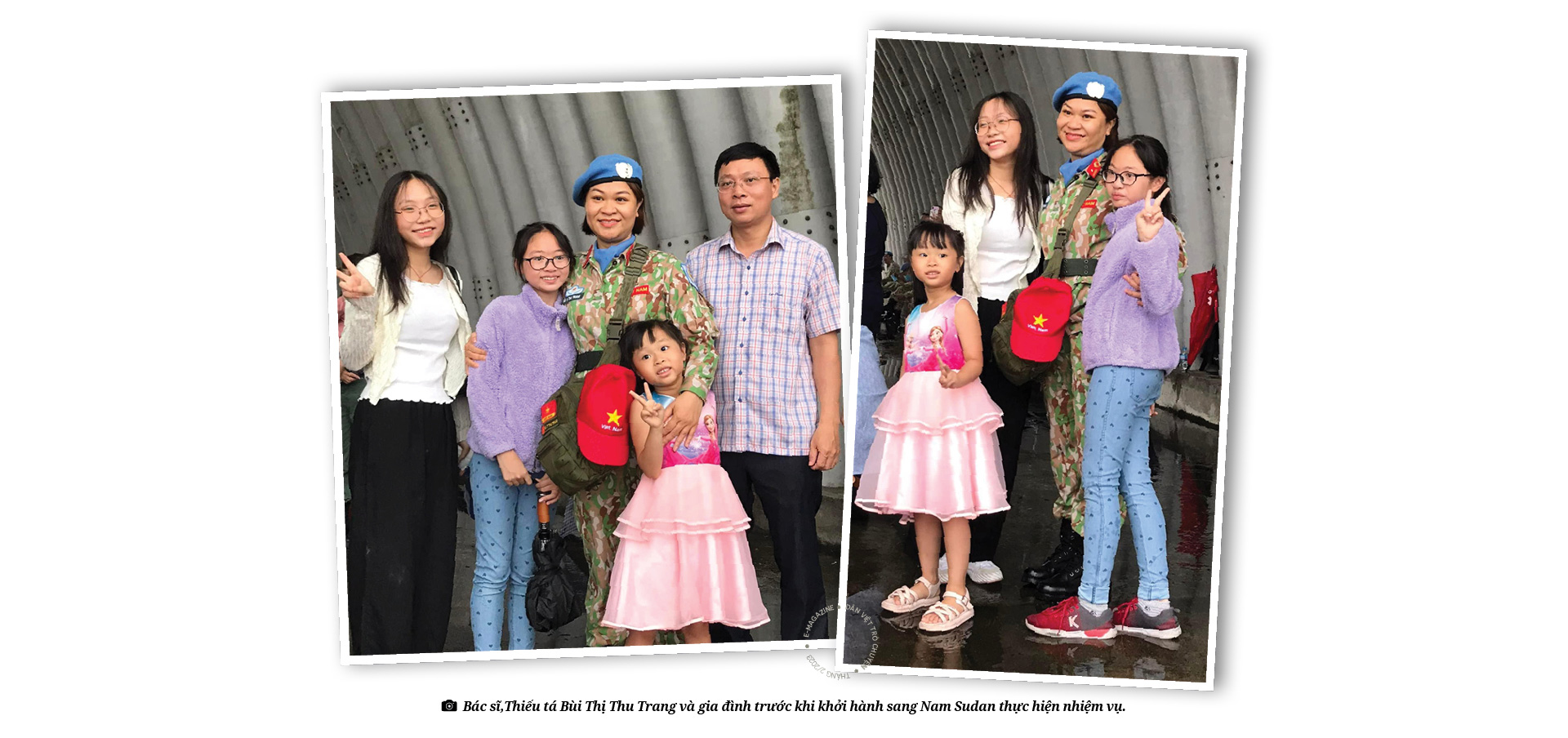
How did your husband react when he knew you were leaving for your assignment ?
- I am lucky to have a husband who understands and always supports me. My husband's job often requires him to travel far away for work. When he learned that his wife had to go on an international mission, he personally asked his boss to create conditions for him to live near his family so that he could take care of the children.
Besides working hours, on each kilometer of taking the children to school, he only felt at ease when the night began. After I talked to him and received support from both sides of my family, my husband said something that I will never forget in my life: "Go early, come back early, take care of your health, I will take care of everything." So a 40-year-old mother was determined to set out, explore her own limits, and find the truth, goodness and beauty in a harsh environment.
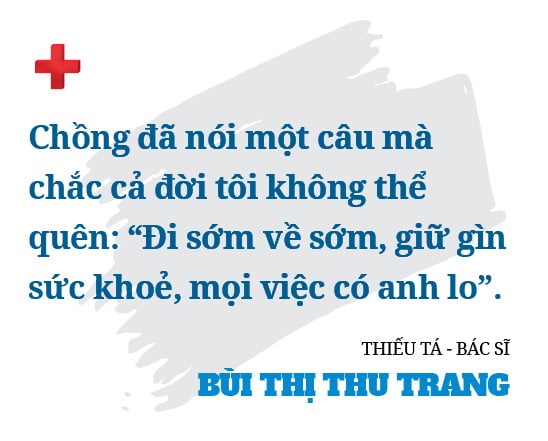
Besides your expertise as an obstetrician, do you participate in other professional work at the Field Hospital ?
- In addition to my main expertise in obstetrics and gynecology, I also perform surgeries with my fellow surgeons. I myself have many years of experience in the field of surgery, so I have also shared and imparted many new techniques and treatment methods to young doctors in the department. In return, young people pass on to the previous generation like me a passion to devote themselves to all the good things in life.
In addition, I am also the leader of a women's group with 12 members. Although the number of people is small, the work related to women is also a lot. We have to divide the work reasonably to avoid overlapping work, create many cultural and spiritual products to make life abroad more enjoyable, and reduce the feeling of missing family and homeland.
The months at the field hospital seemed to have changed a lot of your views and thoughts about life . If you could choose one wish, what would you wish for ?
- This period of time has been, is and will be the most memorable period of my life. When I witness lives more unfortunate than mine, witness women who have no rights in their families, no reproductive health care… I feel so lucky.
Women here are arguably the most disadvantaged in the world. They have no rights but are the main labor force. They have almost no access to family planning methods, the HIV infection rate is very high; children are not cared for, they give birth and grow up on their own… it is very heartbreaking to see.
So if I have any wish, I only wish that the women and children here are cared for and nurtured to have a better life. And my presence and that of my colleagues here also contribute to making that wish come true.
Thank you! On the occasion of Vietnamese Doctors' Day February 27, I wish you and your colleagues good health and success in your assigned tasks!
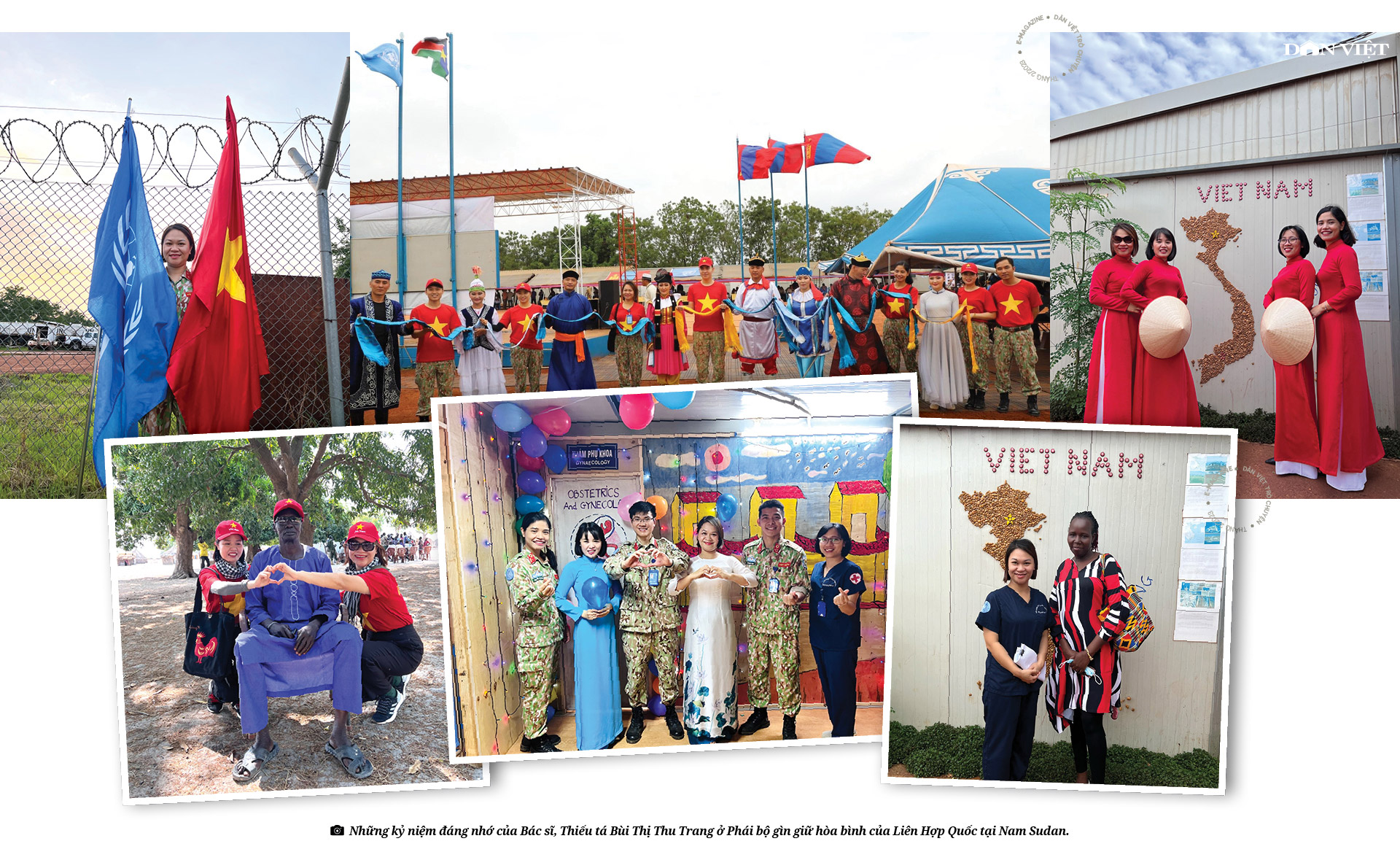
Source





![[Photo] Prime Minister Pham Minh Chinh chaired a meeting of the Steering Committee on the arrangement of public service units under ministries, branches and localities.](https://vphoto.vietnam.vn/thumb/1200x675/vietnam/resource/IMAGE/2025/10/06/1759767137532_dsc-8743-jpg.webp)
![[Photo] Prime Minister Pham Minh Chinh chairs a meeting of the Government Standing Committee to remove obstacles for projects.](https://vphoto.vietnam.vn/thumb/1200x675/vietnam/resource/IMAGE/2025/10/06/1759768638313_dsc-9023-jpg.webp)



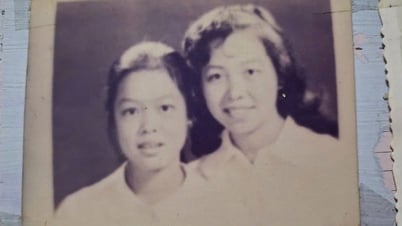
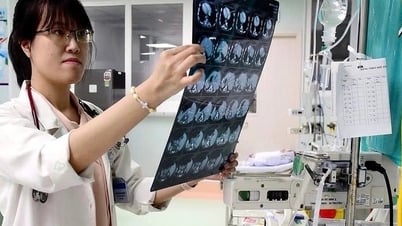

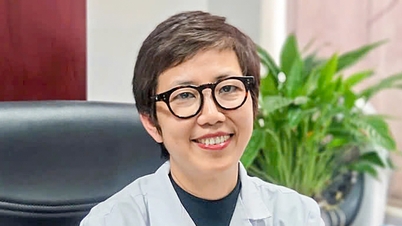
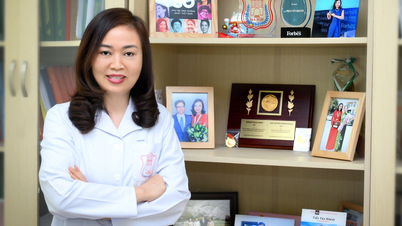
















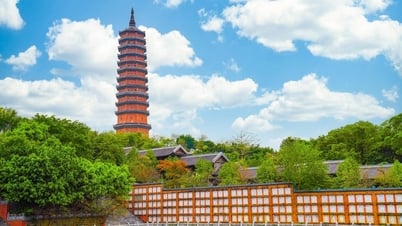



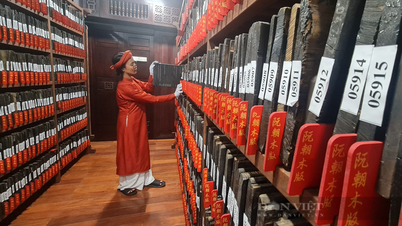
















































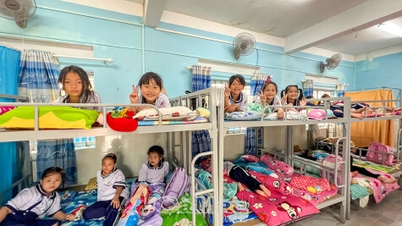

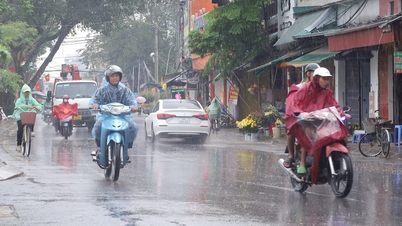













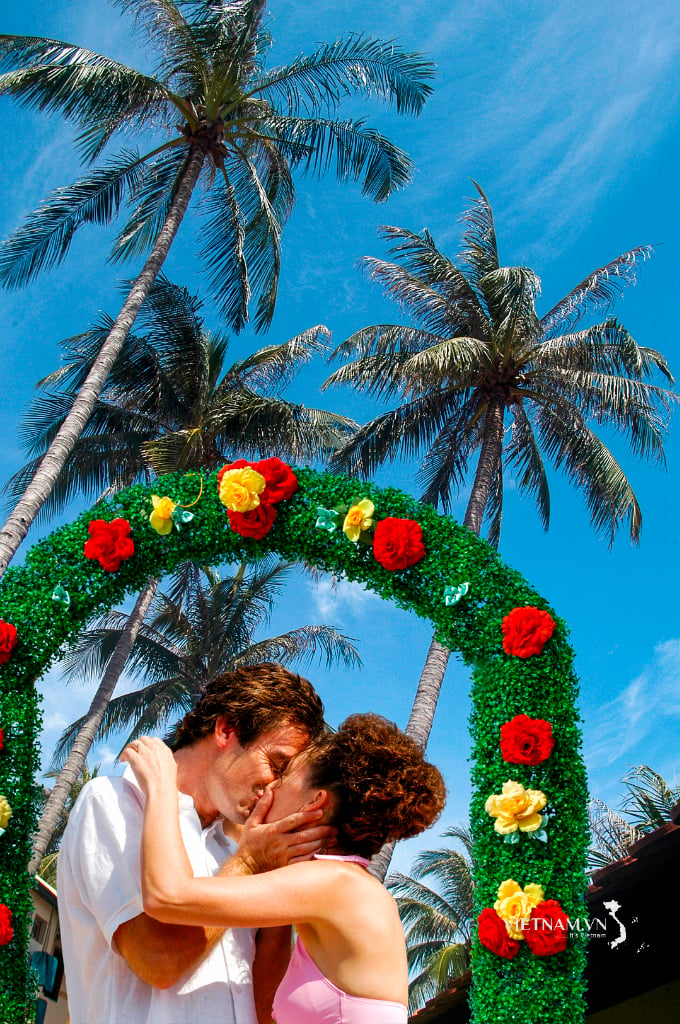
Comment (0)